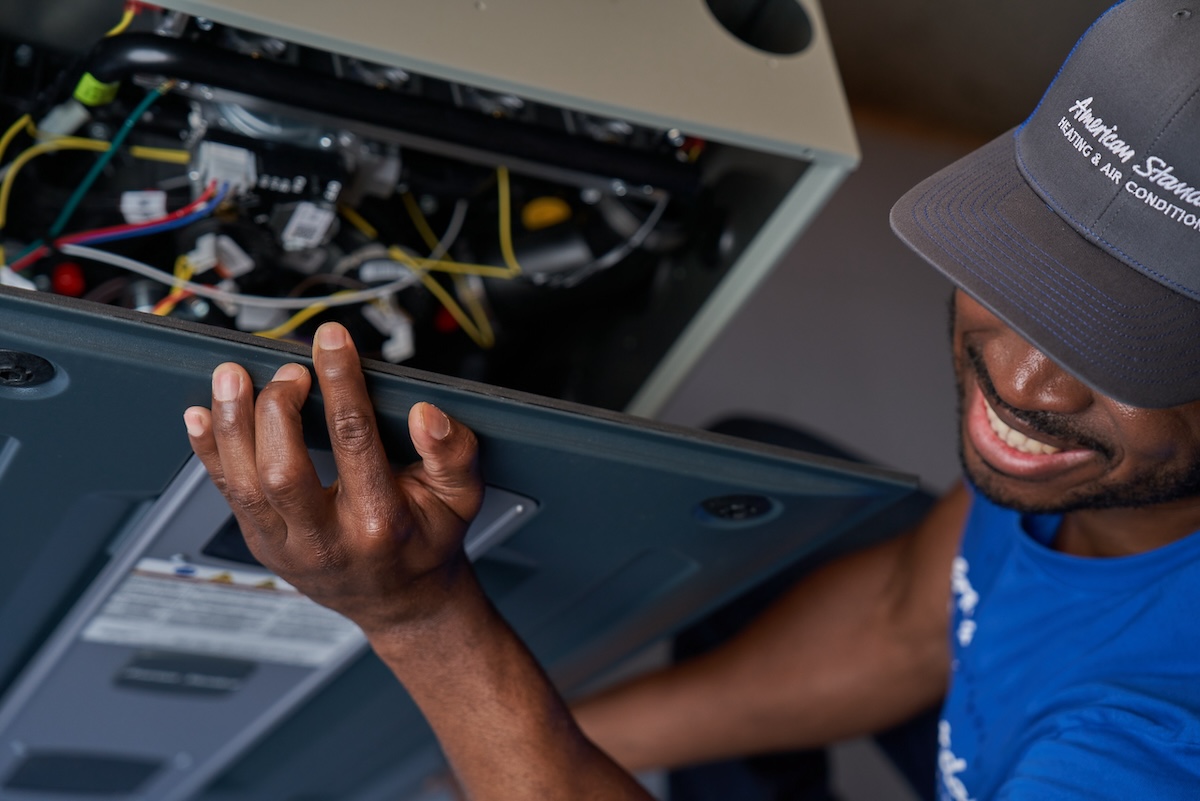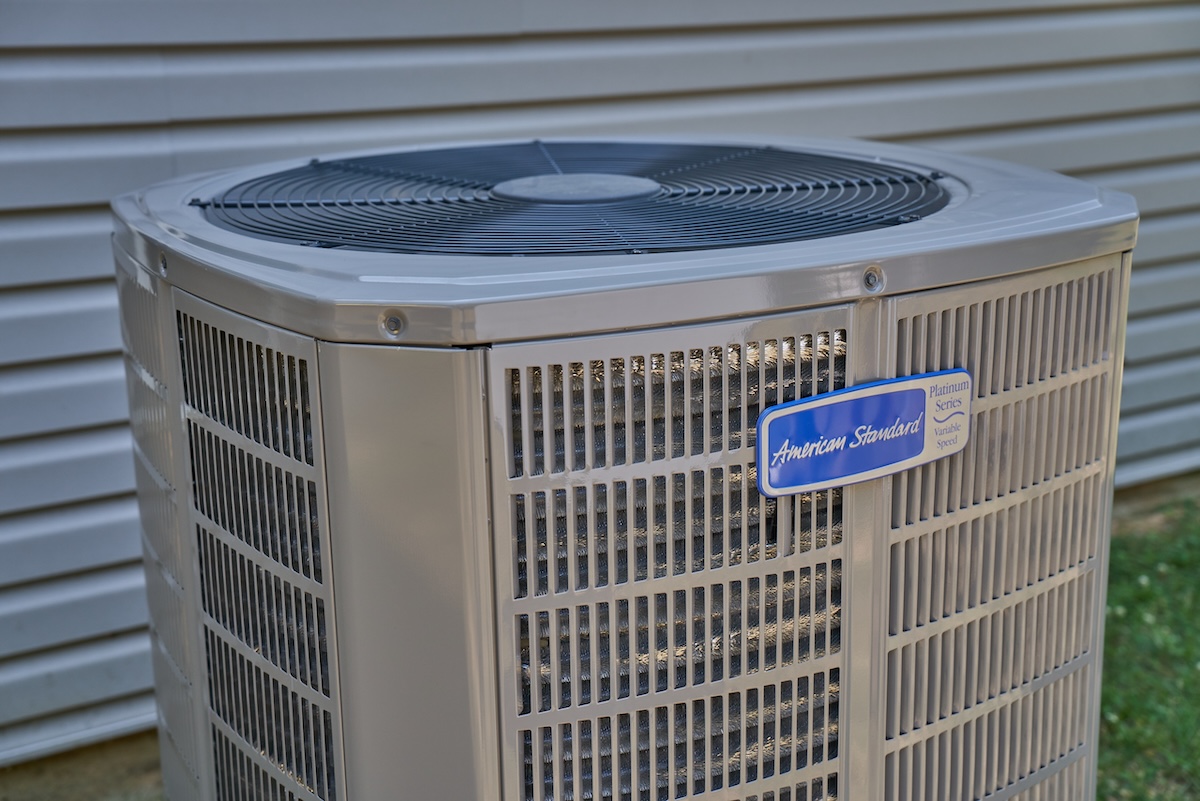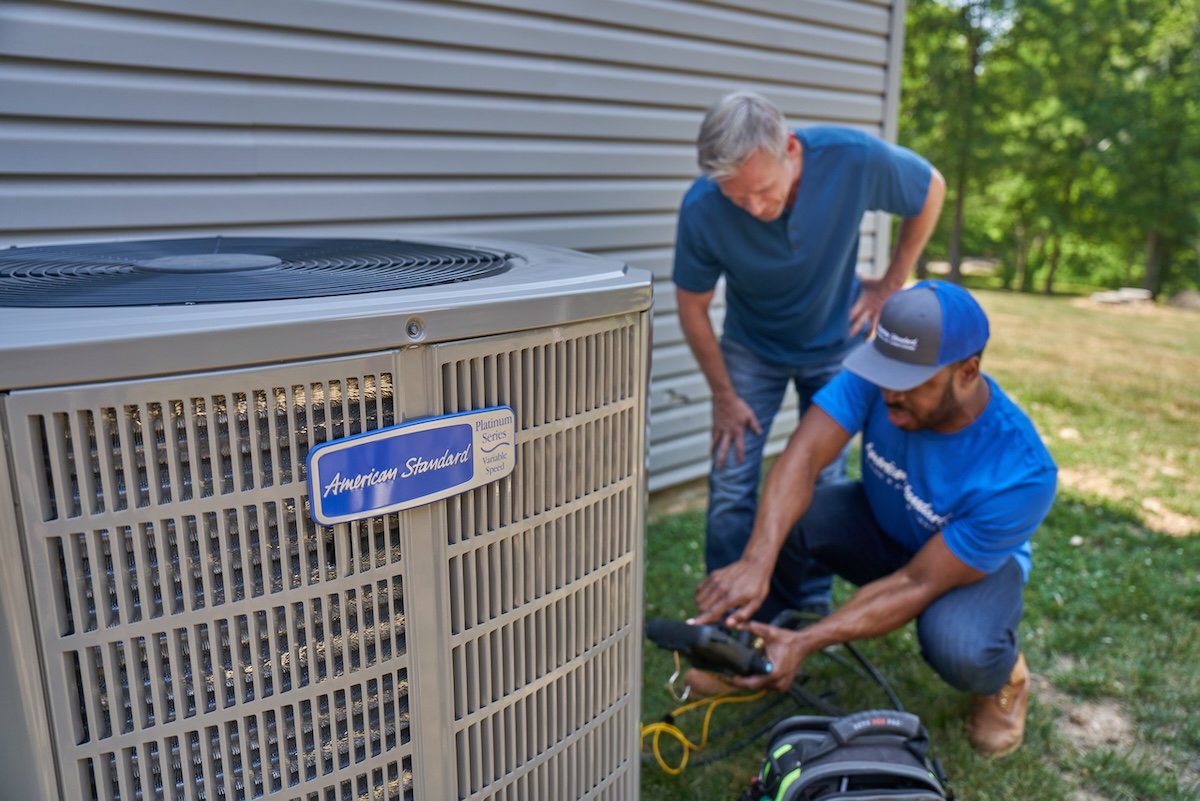We may earn revenue from the products available on this page and participate in affiliate programs. Learn More ›
Thanks to recent advancements in technology, an electric air-source heat pump like the AccuComfort Platinum 20 from American Standard Heating and Air Conditioning can save households hundreds of dollars in annual energy costs. And since the federal government, power companies, and state and local governments are offering incentives in the form of tax credits and rebates for those who buy a heat pump, there’s really never been a better time to make the switch.
If you’re considering taking the leap, read on to find out how these appliances work, what makes them energy efficient, and how to size one for your home.
Q: How does a heat pump work?
A: Unlike furnaces that work by creating hot air, heat pumps work by transferring existing heat either indoors or outdoors, depending on whether you’re warming or cooling your home. When functioning as an air conditioner, the heat pump uses coils to pull heat out of the indoor air, move it through a compressor, and deposit it outside. It repeats this cycle until the temperature inside the home lowers to the setting on the thermostat.
When functioning as a heater, the heat pump pulls heat out of the outdoor air (yes, there is actually heat present in very cold outdoor air). Then it transfers heat through the compressor before releasing it indoors to raise the temperature in the home.
Heat pumps are cube-shaped appliances that look similar to central air conditioning units. The average heat pump measures about 3 feet wide by 3 feet deep by 3 feet tall, varying in size depending on its heating and cooling capacity.
Q: How much electricity does a heat pump use?
A: How much electricity a heat pump uses depends on its efficiency rating and your home. Heat pumps have a Seasonal Energy Efficiency Ratio (SEER2) rating, which measures an air conditioner’s cooling efficiency, and a Heating Seasonal Performance Factor (HSPF) rating, which measures how efficiently a heat pump warms up your home.
A SEER2 rating is calculated by dividing a heat pump or air conditioning unit’s cooling output by its energy input. You can determine a HSPF rating by dividing the total seasonal heating output by total energy consumption. The higher the SEER2 or HSPF rating, the more efficient the heat pump.
The AccuComfort Platinum 20 Heat Pump, for example, has a high SEER2 rating of up to 20.5 and an HSPF rating of up to 8.7. For comparison, most air conditioners have a SEER rating that falls between 13 and 21, and the Department of Energy requires heat pumps to have an HSPF rating of 7.5 or higher.
How much the heat pump will cost you to run also depends on external factors, says Mark Woodruff, senior product manager for American Standard. “Exactly how much electricity they will use will depend on how large of a system your home needs, how well insulated it is, and your local climate,” he says.

Q: Electric heat pump vs. gas furnace: Which is better for the environment?
A: Heat pumps are better for the environment for several reasons. Since heat pumps only transfer existing heat, they need far less energy to operate than furnaces that work by generating heat. Modern gas furnaces range from 90 to 100 percent efficient. Today’s heat pumps reach 300 to 400 percent efficiency or more.
This means that while a gas furnace puts out about the same amount of energy in the form of heat as it consumes, a heat pump puts out three to four times as much heat energy as it uses in electricity.
Heat pumps are also cleaner. “Heat pumps use electricity to generate warmth [whereas furnaces] burn fossil fuels like natural gas or propane,” Woodruff says. He adds, “Heat pumps using electricity from a renewable energy grid contribute significantly less environmental emissions.”
Q: Are heat pumps suitable for cold climates?
A: It used to be that heat pumps struggled to keep homes warm in colder weather. Many older heat pumps were paired with a backup heat source, such as an electric heating element or gas furnace, which would kick on when the heat pump could no longer keep up.
“With today’s technology, it’s a myth that you can’t have a heat pump efficiently heat your home if you live in a colder climate,” Woodruff says. “Heat pump technology has evolved such that they can provide heat at much lower outdoor temperatures than in the past—in many cases, well below zero degrees Fahrenheit.”
A newer cold-climate heat pump uses vapor injection to boost heating capacity when temperatures drop. For example, vapor injection heat pumps can provide heating at temperatures well below zero; some as low as -20 degrees Fahrenheit. And many modern heat pumps also come equipped with variable-speed compressors that allow them to maintain consistent temperatures in cold weather. This eliminates the wide temperature swings characteristic of older single-speed heat pumps. As a result of these advancements, hybrid systems are a necessity only in climates that experience extreme cold.

Q: What size heat pump do I need?
A: Heat pumps are sized in tons, a practice that stems from the early days of air conditioners when their cooling power was rated by the equivalent amount of ice it would take to supply the same amount of cooling. A 2-ton air conditioner, for example, would have the same cooling power as melting 2 tons of ice in a day.
Along with tons, heat pumps are also sized in British thermal units (BTUs), which is the amount of heat required to raise 1 pound of water 1 degree Fahrenheit.
While the sizing terms can be confusing, identifying the size of heat pump you need for your home isn’t difficult. Common sizing today ranges from 2 to 5 tons, or 12,000 to 60,000 BTUs. Each ton is enough to heat and cool 500 square feet. This means a 2,000-square-foot home could require a 4-ton heat pump, and a 2,500-square-foot home could need a 5-ton heat pump. Since 1 ton is equivalent to 12,000 BTUs, making the calculation in BTUs is simple. For example, a 2,000-square-foot home would require a 4-ton heat pump, which equates to 48,000 BTUs (4 x 12,000).
Woodruff says it’s important to keep in mind that sizing also depends on other factors, such as your local climate and the level of insulation in your home. For this reason, it’s best to contact an American Standard Customer Care Dealer who can help you find the right size heat pump for your home.
When purchasing a heat pump, make sure to purchase one that qualifies for the heat pump tax credit offered by the federal government.
Q: How do you install a heat pump?
A: Heat pump installation is not a DIY project. This type of job involves working with refrigerant and refrigerant lines, running electrical connections from your circuit breaker box to the heat pump. It also requires the use of specialty tools such as vacuum pumps, manifold gauges, and refrigerant scales. The project is even more complicated if you’re replacing an old heat pump or AC unit, as you’ll need to recover refrigerant from the existing unit per Environmental Protection Agency (EPA) regulations when you remove it.
Given the complexities of heat pump installation, it’s best to hire a licensed pro, such as an American Standard HVAC professional, to ensure the install is done safely and correctly.
Q: Who makes the best heat pump system?
A: With more than 100 years in the business, American Standard Heating and Air Conditioning ranks as one of the best HVAC companies on the market, and its representatives can answer your heat pump questions. It also should come as little surprise that the company makes some of the top heat pump systems, including the American Standard AccuComfort Platinum 20 Heat Pump.
This state-of-the-art heat pump uses variable speed heating and cooling technology that makes it one of the most efficient heat pump systems you can buy. It boasts a SEER2 rating of up to 20.5 and an HSPF rating of up to 8.7. Plus, it incorporates AccuComfort technology, which means it can maintain consistent temperatures in your home within a half degree.



